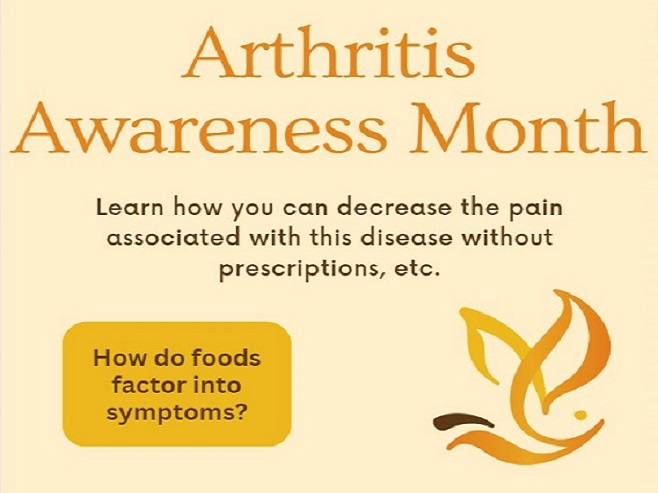
Arthritis Awareness Month Blog Series - How do foods factor into symptoms?
May 26, 2023
Yesterday we shared information and resources on how injuries can make this painful disease worse. If you missed it, click here. Today, in this last installment of our series, we talk about making healthy food choices which can help reduce inflammation. Diet won't cure arthritis, but the right food choices can help by controlling the inflammation that wreaks havoc in the body, delivering nutrients your body needs and helping you maintain a healthy weight. That’s important because excess weight adds to pressure on achy joints and can make certain RA meds less effective. What’s more, body fat produces proteins called cytokines that promote inflammation.
Studies show that a Mediterranean diet, with lots of fruits and vegetables, whole grains and healthy fats is a good choice for people with RA. Here’s a look at some foods you should be eating.
Fatty fish. Salmon, trout, mackerel, tuna, sardines, herring and other cold-water fish are rich in omega -3 fatty acids, which may help control inflammation. Your body needs a healthy balance of omega-3 and omega-6 fatty acids. Researchers have found that a greater ratio of omega-6s to omega-3s is associated with an increase in chronic inflammatory diseases like arthritis. So it’s important to reduce omega-6s – which may provoke inflammation and are found in meats, certain oils and in fried and processed foods that contain those oils – and increase omega-3s.
Fruits and veggies. Fruits and vegetables are rich in antioxidants, which help stabilize molecules called free radicals that can trigger inflammation and damage cells. They’re also packed with vitamins and minerals the body needs and in polyphenols, all of which may help lower C-reactive protein (CRP), a marker of inflammation. To get the greatest health benefits, eat several types of fresh or frozen fruits each day, but watch out for sugar content in frozen options. Eat a colorful variety of veggies to get the most nutrients. Aim for two cups of fruits and two and a half to three cups of vegetables per day – fewer if you get less than 30 minutes of exercise a day and more if you’re more active.
Whole grains. Oats, whole wheat, brown rice, quinoa and other whole grains may lower levels of CRP and reduce the risk of heart disease, which is elevated in people with RA. Whole grains are higher in nutrients and fiber than refined grains. Plus, many products with refined grains contain ingredients that are not healthful, such as added sugars and saturated fats. Read labels and choose breads, cereals and other products that specify a whole grain as a primary ingredient.
Peas and beans. These legumes are a great source of protein, which is important for muscle health – and people with RA are prone to muscle loss. What’s more, peas and beans are practically fat free, contain antioxidants, and some are rich in folic acid, magnesium, iron, zinc and potassium, all known for their heart and immune-system benefits. Black, garbanzo and red kidney beans and black-eyed peas are good choices.
Nuts. Full of healthful monounsaturated fat, nuts are recognized for their heart-protective properties and important nutrients. Try pine nuts, pistachios, hazelnuts and almonds. Walnuts are particularly good for people with RA because they’re high in omega-3 fatty acids. (Ground flaxseed is another good plant source of omega-3s.) But don’t go overboard eating nuts; they contain healthy fats, but they are also high in calories.
Olive oil. Use olive oil instead of other oils and fats. In addition to healthy monounsaturated fat, it contains a compound called oleocanthal that reduces inflammation and acts like ibuprofen in alleviating pain. But eat it in moderation; as with all oils, it’s a fat that can lead to weight gain.
Here are eight foods known to contribute to inflammation and the aggravation of your arthritis symptoms.
- Sweets - Consuming too much sugar increases inflammation in your body
- Dairy
- Fatty foods
- Carbohydrates
- Tobacco and alcohol
- Advanced glycation end (AGE) products
- Gluten
- Additives
High blood sugar, and smoking, can stiffen and put stress on the tissues that supports or protects your joints, leading to arthritis pain. Learn how Blue Cross can help you quit.
Thank you for reading our Arthritis Awareness Month article series. To learn more about Avinity’s senior living communities, click here. For more information about Avinity, feel free to contact us at 612.861.2799 or [email protected].
Sources:
Best Foods for Rheumatoid Arthritis | Arthritis Foundation
8 Inflammation-Causing Foods to Avoid When You Have Arthritis: Rheumatology and Allergy Institute of Connecticut, LLC: Rheumatology
Tobacco and Smoking Cessation Program | BlueCrossMN
